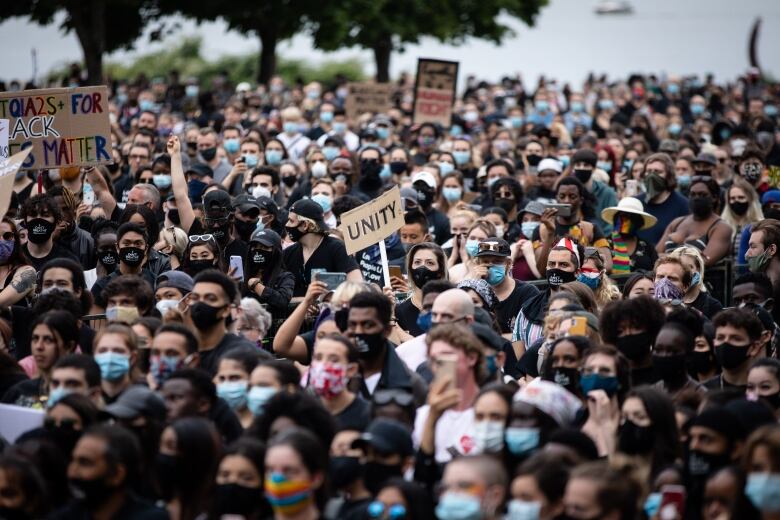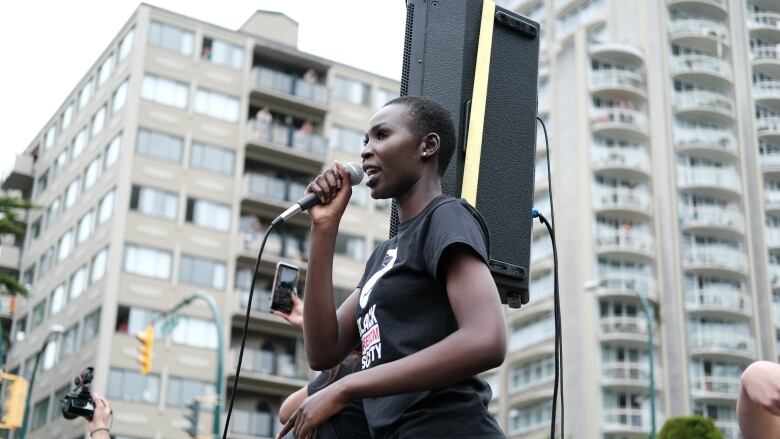After 2020's racial reckoning, Black activists urge Canadians to keep conversation going
Activists call for open conversations about race as pandemic threatens to stall movement for more equality

Inlate November, comedian Ola Dada and his girlfriend were visiting a family memberat a hotel in Vancouver. While outside, they noticed a group of young people throwing firecrackers from one of the hotel balconies.
Dada says they were hitting his car, so he ran over to say something. The reaction he got from one of the hotel guests, a young woman, shocked him.
"All I said was, 'Stop throwing firecrackers at my car,' and then the immediate response was, 'Get away, N-bomb, N-bomb, N-bomb, you can't do anything N-bomb,'" said Dada.
The 25-year-old was in disbelief. Not only because ofthe "racist confidence"displayed by theyoung woman, but the fact that it was 2020 a year when thousands of people marched instreets around the world, including in Vancouver, to show that Black lives matter.
"It just goes to show the school system has a long way to go in terms of educating younger kids on how serious saying those words can be. It was very jarring," said Dada.

Despite the racial reckoning that made headlines in 2020, those who organized rallies throughout the late springand summer say support for the movement isn't as visible now, highlighting the need to keep the conversation going.
"You're not really hearing a lot about it these days. No one's talking about it because it's not trending," said Juneteenth and Emancipation Day rally organizer Nova Stevens.
Pandemic hindering progress
Stevens is hopeful things will improve for Black people, but fearsthe COVID-19pandemic will continue to slow progress from being made.
It's hard to hold spacesfor open conversations about race with ongoing restrictions on gatherings, she said.

June Francis, co-chair of the Hogan's Alley Society a non-profit organization that works to highlight and preserve Black history in Vancouver and B.C. said the Black community was working on overdrive in 2020. Even though it was tiring,she noticed important changes, including non-Black Canadians finally standing with the Black community.
"There's been an acknowledgement of systemic racism and this acknowledgement is huge," said Francis.
"This has been a long time coming."
Francis saidthere have been many commitments made to dismantle systemic racism in B.C., such as plans to embed Black history into the education system and apush to start collecting disaggregated race-based health data to better understandracial inequity in the health-care system.
But in 2021, she saidthere needs to be more action.
'Continual learning' needed
Francis encourages everyone to look around and ask themselves whether they see racialized people in positions of power and if not, why not?
"You must do something to change it.You have to become anti-racist. It's not sufficient to just sit and wait," Francis said.
"I think what needs to happen now is to move away from this idea that we are at the periphery of the society and others get to make these decisions for us, to moving us to the centre, to making sure that we're leading the way."

Having these open conversations about race is something Stevens is pushing for, too.
"I think racism needs to not be a taboo. People are afraid to discuss the topic of race like, if you talk about it that means you're racist all of a sudden. It's OK to have open conversations," said Stevens.
ButDada saidunderstanding the topic of race will take time and that there isn't just one solution.
"It's not something where we can scream Black Lives Matterin the summer, and by the time winter rolls around everyone forgets that this is still a thing," he said.
"What I want people to take from this is it's a continual learning process. It's going to take a while to debunk a lot of stereotypes."

For more stories about the experiences of Black Canadians from anti-Black racism to success stories within the Black community check out Being Black in Canada, a CBC project Black Canadians can be proud of. You can read more stories here.













_(720p).jpg)


 OFFICIAL HD MUSIC VIDEO.jpg)
.jpg)



























































































